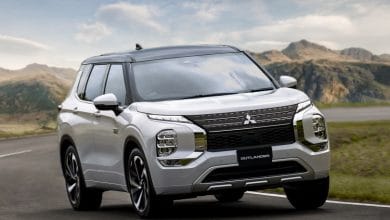
Contents [hide]
To reassure the public
The “zero emission” mobility market is growing and is expected to grow even further in the near future. From now on, it is a question of raising the level of requirement of a vehicle which is no longer intended only for an avant-garde clientele, but which also seeks to convince the uninitiated. This lack of originality deserves to be saluted. Because it is also with ordinary models that the electric car will fit into real life. This is the main reason for the electrified version of the GV70.
-

PHOTO PROVIDED BY GENESIS
The Genesis GV70 Electrified benefits from the same platform as the Ioniq 5, Ioniq 6 and Kia EV6.
-

PHOTO PROVIDED BY GENESIS
The Genesis GV70 Electrified offers sufficient roominess for four people and a suitable trunk for the category.
-

PHOTO PROVIDED BY GENESIS
The Genesis GV70 Electrified features impeccable craftsmanship, high-quality materials, tasteful layouts and easy-to-learn controls.
-

PHOTO PROVIDED BY GENESIS
The back seat of the Genesis GV70 Electrified
-

PHOTO PROVIDED BY GENESIS
However, the extra pounds are felt in terms of the firm type suspension (in compression more than in rebound) and in the transition and trajectory change phases.
-

PHOTO PROVIDED BY GENESIS
The console of the Genesis GV70 Electrified
-

PHOTO PROVIDED BY GENESIS
The selectors of the Genesis GV70 Electrified
-

PHOTO PROVIDED BY GENESIS
Genesis GV70 Electrified controls
-

PHOTO PROVIDED BY GENESIS
In just over 60 minutes, we will have reconstituted 80% of the battery charge on a level 3 terminal.
1/9
Some electric enthusiasts will no doubt find it unfortunate that this model was designed on a platform originally intended to accommodate a thermal engine. According to them, this conversion does not make it possible to fully exploit the architectural advantages offered by an electric car, particularly in terms of size and habitability.
No gain, but no loss
The compactness of an electric motor and the installation of the batteries under the floor generally contribute to freeing up an interior volume comparable to that of a vehicle that takes up more space in the street. And because the floor is perfectly flat, all passengers can have more living space than a traditional petrol model. It will be understood that the electrified version of the GV70 does not achieve any gain in these areas. No real losses, either. We must therefore deal with sufficient roominess for four people and a suitable trunk for the category.
That said, and this is where the problem lies, the Electrified GV70 does little better than the just as recent GV60. This other electric creation from the South Korean manufacturer benefits from a platform (the same as the Ioniq 5, Ioniq 6 and Kia EV6) intended for electrification. More compact, the GV60 offers a habitability almost similar to that of the GV70 (electric or not). Only a smaller trunk volume. And it costs a lot less ($71,150). But some new electric converts will no doubt be willing to overlook the price. To find, for example, a more traditional interior and, with a few details, identical to that of the petrol version. That is to say, an irreproachable finish, high quality materials, tasteful layouts and easy-to-learn controls.
Fewer commitments
The gasoline-powered GV60 is one of the most fun midsize utility vehicles to drive. What about its electrified version? She lets herself be led docilely, without her almost 2.3 tons being remembered with too much insistence to our good memories.
Driving this silent machine that ignores vibrations is very pleasant. The accelerations, if they are not violent enough to tackle you in the backrest, have the merit of being progressive, smoothly.
However, the extra pounds are felt in terms of the firm type suspension (in compression more than in rebound) and in the transition and trajectory change phases. And even more clearly, when you have to brake hard. Therefore, the ABS system – rather ticklish – draws like Lucky Luke (faster than his shadow) and causes, on our test vehicle at least, a brief but untimely blockage.
This Electrified GV70, which imposes a significantly lower cost of use than that of its petrol equivalent, connects to a charging station by manually opening a valve hidden in the patterns of the false grille. It is easy to imagine that the location of this seemingly fragile “trap” could cause problems when it becomes trapped in the ice and slush. That said, in a little over 60 minutes, we will have reconstituted 80% of the battery charge on a level 3 terminal. If we have a heavy foot on the accelerator pedal, the autonomy will not reach the 384 km claimed by the manufacturer. On the other hand, by adopting a flexible, relaxed and anticipatory driving style, it is possible to pass – just a little – the 400 km mark.
The main obstacle to the acquisition of this pretty and discreet “mobility object” remains its price. And don’t count on governments to come to your aid. The GV70 Electrified is not eligible for any subsidy. The price is 32% higher than the budget that must be devoted to the purchase of the GV70 powered by an internal combustion engine. Even a GV60 is significantly cheaper. A balance sheet that probably cannot be clarified until Genesis revisits the current model in depth.
Genesis GV70 Electrified
Suggested retail price
$84,150
Government discounts
None
Electric autonomy/charging
- 384 km (manufacturer)
- Level 3 – 50kWh
- From 10% to 80%: 1 h 13 min
WE love
- Impeccable finish
- Easy handling
- Personalized brand service
We love less
- Disappointing autonomy and efficiency
- Delicate braking
- Strong price
Our Verdict
More expensive and less advanced (technically) than the GV60
The Press will soon publish the test of the following vehicles: Audi A7/RS7, Ford Mustang, Toyota Crown and Volkswagen Atlas. If you own one of these vehicles, we would love to hear from you about your experience.
Technical sheet

PHOTO PROVIDED BY GENESIS
Genesis GV70 Electrified
Engines
- Electric permanent magnets
- 429 hp (483 hp with “overboost” for 10 s)
- 516 lb-ft of torque
Performance
- Weight: 2285 kg
- Ground clearance: 174mm
- Maximum towing capacity: 1587 kg
Gearbox
- Standard: automatic
- Optional: none
- Drive mode: all-wheel drive
Tires
Electric autonomy/charging
- 384 km (manufacturer)
- Level 3 – 50kWh
- From 10% to 80%: 1 h 13 min
Consumption/Battery
- 19.2 kWh/100 km (best consumption obtained)
- 77.4kWh Li-Ion
Dimensions
- Wheelbase: 2875mm
- Length: 4715mm
- Height: 1630mm
- Width: 1910 mm (exterior mirrors excluded)
(Almost) equal game

PHOTO PROVIDED BY GENESIS
Genesis GV60
Unveiled in the midst of the pandemic, the Genesis GV60 is based on the Hyundai Group’s E-GMP architecture. The Electrified GV70, on the other hand, uses only a few of the components of this platform. That said, the GV60’s range is slightly longer (399 km compared to 383 km for the GV70 Electrified) and requires less time to refuel (7.2 hours compared to 7.9 hours), according to data from Natural Resources. Canada. The federal agency estimates that over a full year, it will cost $27 less to refuel a GV60 compared to an Electrified GV70.
“Made in USA”

PHOTO PROVIDED BY GENESIS
Genesis GV70 Electrified
While the GV60 originates in South Korea, the GV70 Electrified is helping to run the American assembly lines of the Hyundai group in Alabama. Currently, the Genesis brand has three 100% electric vehicles in its lineup. It predicts that the latter will be fully electrified by 2030.












